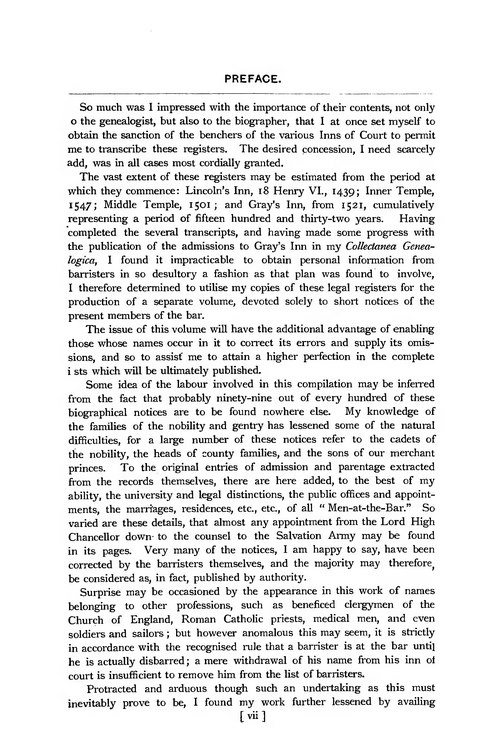PREFACE.
So much was I impressed with the importance of their contents, not only the genealogist, but also to the biographer, that I at once set myself to obtain the sanction of the benchers of the various Inns of Court to permit me to transcribe these registers. The desired concession, I need scarcely add, was in all cases most cordially granted.
The vast extent of these registers may be estimated from the period at which they commence: Lincoln's Inn, 18 Henry VI., 1439; Inner Temple, 1547; Middle Temple, 1501; and Gray's Inn, from 1521, cumulatively representing a period of fifteen hundred and thirty-two years. Having completed the several transcripts, and having made some progress with the publication of the admissions to Gray's Inn in my Collectanea Genealogica, I found it impracticable to obtain personal information from barristers in so desultory a fashion as that plan was found to involve, therefore determined to utilise my copies of these legal registers for the production of a separate volume, devoted solely to short notices of the present members of the bar.
The issue of this volume will have the additional advantage of enabling those whose names occur in it to correct its errors and supply its omissions, and so to assist' me to attain a higher perfection in the complete lists which will be ultimately published.
Some idea of the labour involved in this compilation may be inferred from the fact that probably ninety-nine out of every hundred of these biographical notices are to be found nowhere else. My knowledge of the families of the nobility and gentry has lessened some of the natural difficulties, for a large number of these notices refer to the cadets of the nobility, the heads of county families, and the sons of our merchant princes. To the original entries of admission and parentage extracted from the records themselves, there are here added, to the best of my ability, the university and legal distinctions, the public offices and appointments, the marriages, residences, etc., etc., of all " Men-at-the-Bar." So varied are these details, that almost any appointment from the Lord High Chancellor down- to the counsel to the Salvation Army may be found in its pages. Very many of the notices, I am happy to say, have been corrected by the barristers themselves, and the majority may therefore^ be considered as, in fact, published by authority.
Surprise may be occasioned by the appearance in this work of names belonging to other professions, such as beneficed clergymen of the Church of England, Roman Catholic priests, medical men, and even soldiers and sailors; but however anomalous this may seem, it is strictly in accordance with the recognised rule that a barrister is at the bar until he is actually disbarred; a mere withdrawal of his name from his inn of court is insufficient to remove him from the list of barristers.
Protracted and arduous though such an undertaking as this must inevitably prove to be, I found my work further lessened by availing
[vii]
